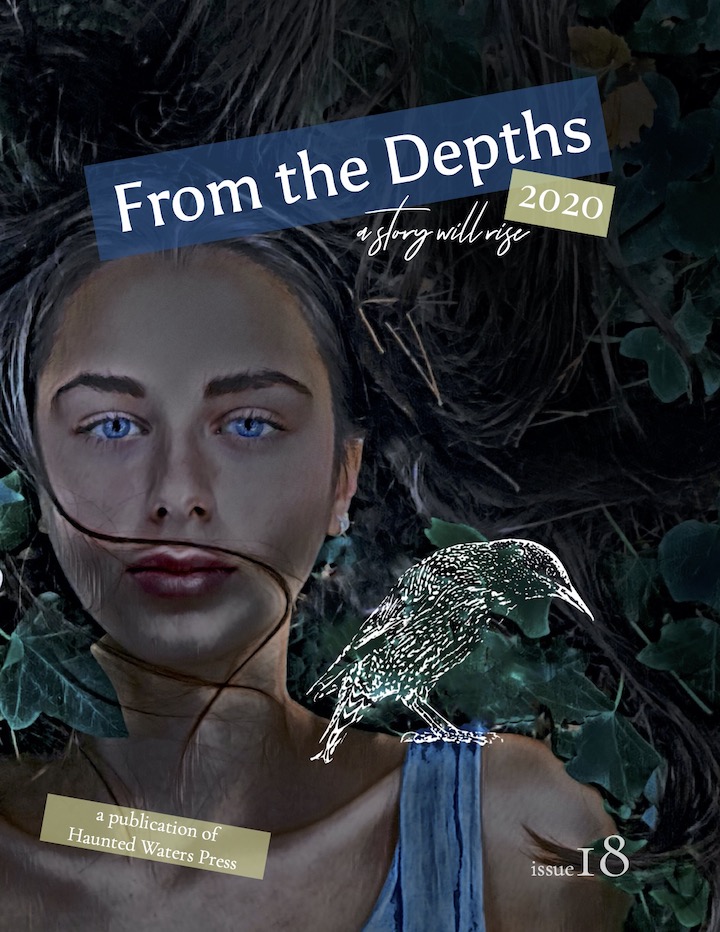Welcome! Featured author interviews continue today with HWP Contributor Larry Brown. Larry's work of fiction Flintstones is featured in the 2020 issue of From the Depths. Enjoy!
What first sparked your interest in writing?
I thought I was going to pursue acting. I spent summer '78 in New York studying at the Lee Strasberg Theatrical Institute (through NYU), then moved to Toronto and began auditioning. But the voice in my head kept repeating, "I don't know if this is what I want to do..." Then in 1980, I took a continuing education writing course at Glendon College in Toronto. Almost immediately, I knew I had found my future. I HAD to write. So I wrote, poorly but blindfully ... nineteen years later, I had my first story accepted. (By the way, you never lose the ability to write poorly.)
Do you practice any other forms of writing beyond flash?
In the early days, I wrote four bad novels. My book, TALK, has only one flash story, the others in the 2500-3800 range. My concentration on flash became a necessity as my Parkinson's grew worse. I had to learn to compose on a keyboard—I had always written by hand—but the keyboard felt like an obstacle. I could only get short pieces done. Then I began to see/learn that you could do a lot with a little.
Drink your coffee black, consider cream and sugar the adverbs of the food & drink world.
What time of day can we find you writing?
Morning, early afternoon, evening ... depends on my teaching schedule and, in good weather, my tee-off time.
Let’s talk first drafts. Do you compose on a computer, or are you a pen and paper writer?
So when I began, it was pen and legal-size pad of paper. Parkinson's came to town in '97. When it became very difficult to write neatly—actually since school I had printed—I taught myself to write with my other hand, my left. Surprisingly the printing looked almost exactly like my right-handed printing had looked. Then the left hand went, and as I have mentioned, I began the process of learning to compose on my typewriter (now computer).
What advice can you give other writers on writing effective and meaningful stories in under 500 words?
All first drafts are bad—thanks, Mr. Hemingway—so keep carving, cutting, keep learning what the story is about and what it does and does not need ... set it aside for a week, return to it, knives drawn, slaughter darlings if necessary, and if people say, I had to read the story more than once to understand, take that as a compliment.
Do you ever give up on an idea? How do you know when a piece just isn’t working?
Not really give up. More like, I set it aside, and next time I attack it, try to attack from a different angle. When a piece isn't working, it's like I've been shipped to that prison in Papillon ... okay, maybe that's exaggerating ... it just feels like I'm striving to move through thick mud. When things are going well, I get a sensation of space—that there are lots of things I can do with a story.
As a writer, do you find yourself constantly seeking inspiration in the world around you, or do you let the ideas come to you?
I let the ideas come to me.
Is there an under-the-radar writer you wish more people knew about?
This is where some athletes would stare at you from behind their dark sunglasses and say, Me, no one ever gave me a chance, I just gotta play my game, outwork everyone ... no one gives me respect (this is what he says as he signs a 6-year $249 million deal ...) Fritz McDonald, Cedar Rapids, Iowa, recently I read part of his memoir about his time as a waiter at a legendary Hollywood restaurant in the late '70s and early '80s, great stuff, funny and sad and poignant.
What is the best piece of writing advice you’ve been given?
It was acting advice in New York but advice that applies to writing as well: What would be happening if the scene was not taking place? So you surround the scene with details that help bring the scene to life. No detail is too small for it to be put to use. And my personal advice: Drink your coffee black, consider cream and sugar the adverbs of the food & drink world.
If you could tell your younger writing self anything, what would it be?
Buy stock in Apple, and when some guy is willing to give you a chunk of the action for $1000 in this board game called Trivial Pursuit, jump at that opportunity too.

I thought I was going to pursue acting. I spent summer '78 in New York studying at the Lee Strasberg Theatrical Institute (through NYU), then moved to Toronto and began auditioning. But the voice in my head kept repeating, "I don't know if this is what I want to do..." Then in 1980, I took a continuing education writing course at Glendon College in Toronto. Almost immediately, I knew I had found my future. I HAD to write. So I wrote, poorly but blindfully ... nineteen years later, I had my first story accepted. (By the way, you never lose the ability to write poorly.)
Do you practice any other forms of writing beyond flash?
In the early days, I wrote four bad novels. My book, TALK, has only one flash story, the others in the 2500-3800 range. My concentration on flash became a necessity as my Parkinson's grew worse. I had to learn to compose on a keyboard—I had always written by hand—but the keyboard felt like an obstacle. I could only get short pieces done. Then I began to see/learn that you could do a lot with a little.
Drink your coffee black, consider cream and sugar the adverbs of the food & drink world.
—Larry Brown
What time of day can we find you writing?
Morning, early afternoon, evening ... depends on my teaching schedule and, in good weather, my tee-off time.
Let’s talk first drafts. Do you compose on a computer, or are you a pen and paper writer?
So when I began, it was pen and legal-size pad of paper. Parkinson's came to town in '97. When it became very difficult to write neatly—actually since school I had printed—I taught myself to write with my other hand, my left. Surprisingly the printing looked almost exactly like my right-handed printing had looked. Then the left hand went, and as I have mentioned, I began the process of learning to compose on my typewriter (now computer).
What advice can you give other writers on writing effective and meaningful stories in under 500 words?
All first drafts are bad—thanks, Mr. Hemingway—so keep carving, cutting, keep learning what the story is about and what it does and does not need ... set it aside for a week, return to it, knives drawn, slaughter darlings if necessary, and if people say, I had to read the story more than once to understand, take that as a compliment.
Do you ever give up on an idea? How do you know when a piece just isn’t working?
Not really give up. More like, I set it aside, and next time I attack it, try to attack from a different angle. When a piece isn't working, it's like I've been shipped to that prison in Papillon ... okay, maybe that's exaggerating ... it just feels like I'm striving to move through thick mud. When things are going well, I get a sensation of space—that there are lots of things I can do with a story.
As a writer, do you find yourself constantly seeking inspiration in the world around you, or do you let the ideas come to you?
I let the ideas come to me.
Is there an under-the-radar writer you wish more people knew about?
This is where some athletes would stare at you from behind their dark sunglasses and say, Me, no one ever gave me a chance, I just gotta play my game, outwork everyone ... no one gives me respect (this is what he says as he signs a 6-year $249 million deal ...) Fritz McDonald, Cedar Rapids, Iowa, recently I read part of his memoir about his time as a waiter at a legendary Hollywood restaurant in the late '70s and early '80s, great stuff, funny and sad and poignant.
What is the best piece of writing advice you’ve been given?
It was acting advice in New York but advice that applies to writing as well: What would be happening if the scene was not taking place? So you surround the scene with details that help bring the scene to life. No detail is too small for it to be put to use. And my personal advice: Drink your coffee black, consider cream and sugar the adverbs of the food & drink world.
If you could tell your younger writing self anything, what would it be?
Buy stock in Apple, and when some guy is willing to give you a chunk of the action for $1000 in this board game called Trivial Pursuit, jump at that opportunity too.


Lightning Round with Larry Brown

ABOUT THE AUTHOR
Larry Brown lives in Brantford, Ontario. His stories have been published in a number of magazines, including The Malahat Review, Prairie Fire, The Fiddlehead, and internationally in Berlin's SAND Journal. His story collection TALK was published by Oberon Press, and his story 'Triangle' appeared in Best Small Fictions 2017. He recently completed his new story collection KURTIN. He teaches writing workshops throughout Ontario.
Share this Post

